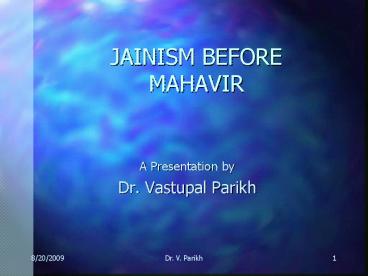JAINISM BEFORE MAHAVIR - PowerPoint PPT Presentation
1 / 19
Title:
JAINISM BEFORE MAHAVIR
Description:
1. Hinduism is an ancient religion. 2. Jainism is an off-shoot ... Rigvedic Period (Hinduism Begins) 3300 - 3000 Yrs ago. Brahmana, Aranyka 3000 2800 Yrs ago ... – PowerPoint PPT presentation
Number of Views:839
Avg rating:3.0/5.0
Title: JAINISM BEFORE MAHAVIR
1
JAINISM BEFORE MAHAVIR
- A Presentation by
- Dr. Vastupal Parikh
2
Two Beliefs1. Jain Belief
- 1. Jainism is millions of year old.
- 2. Jains have 24 Tithankaras - First Rishabhadev
Last Mahavir. - 3. Rishabhdev established Jainism, agriculture,
system of family, law, etc. - 4. Rishabhdev achieved nirvan in Kailash in
Himalayas.
3
Two Beliefs2. Taught in Indian Schools
- 1. Hinduism is an ancient religion
- 2. Jainism is an off-shoot of Hinduism
- 3. Mahavir and Buddha started their religions as
a protest to Vedic practices
4
(No Transcript)
5
Time Chart
ARYANS ARRIVE
RIKHAVDEV PERIOD
MAHAVIR
INDUS VALLEY PERIOD
CHRIST
6500 BCE 8,500 Yrs. ago
1000 BCE 3000 Yrs. ago
000 2000 Yrs. ago
500 CE 1500 Yrs. ago
2500 BCE 4500 Yrs. ago
1500 BCE 3500 Yrs. ago
500 BCE 2500 Yrs. ago
6
Time Frame
- Rikhavdev Era (Agriculture Begins) 8500 - 7000
Yrs ago - Regionalization Era (Rural) 7000 - 4600
Yrs ago - Indus Civilization (Urbanization) 4600 - 3500
Yrs ago - Aryan Invasions (Dravids Migrate) 3500 - 3300
Yrs ago - Rigvedic Period (Hinduism Begins) 3300 - 3000
Yrs ago - Brahmana, Aranyka 3000 2800 Yrs ago
- Upanishad Composed 2800 - 2600 Yrs ago
- Ganges Valley Invasions 2950 -
2600 Yrs ago - Shraman Reforms (Mahavir, Buddha) 2600 - 2500 Yrs
ago
7
Expanded Time Chart
Mahavir
Rikhavites flee Eastward along the Ganges
Indus Valley Period
Buddha
Tenth Tirthankar -Shitalnath
Mahabharat
Aryans Arrive
1600 BCE 1500 1400
1300 1200 1100
1000 900 800
700 600 500
Inter-tribal Aryan wars
Ninth Tirthankar - Pushpadanta
Rigveda composed
Brahmana, Aranyaka Upnishad composed
Nomadic warriors defeat Rikhavites
8
Rikhavdev Period Civilization Development
- Social Order, Family System, Marriage, Law and
Order, Justice, Government - Built Villages, Towns and Cities
- Land Cultivation, Arts and Craft, Brahmi Script,
Reading Writing - Metallurgy - Gold, Silver, Copper
9
Rikhavdev Period Philosophical Development
- Living Beings Have Body and Soul
- Pure Soul is Bliss, Impure Soul is Misery
- Soul purification reduces Misery
- Soul purity requires self-control through
Meditation, Yoga Vows - Meditation in seating (Padmasan) or Standing
(Kayostarg) Positions
10
Indus Civilization
11
Indus Valley Seals
12
Indus Valley Seal
13
Aryan Route To Indus
14
Dravidian Kingdoms
15
Aryan March Eastward
Shatpath Brahmana records Aryan March Eastward
and founding of Videha to the northeast of Patna
by prince Videgha-Mathava. Videgha marched
eastward burning Dravidian kingdoms. Translation
by J. Eggeling - Sacred Books of the East
(1882-1900) Agni thence went burning along this
earth towards the East and Videgha Mathava
followed after him. He (Agni) burnt over (dried
up) all these rivers. Now that river, which is
called sadanira (modern Gandak) flows from the
northern mountains that one he did not burn
over. That one the Brahmins did not cross
thinking, it has not been burnt over by Agni
Vishvanara. Videgha then said to Agni Where am
I to abide? To the East of this river be thy
abode! said he. Nowadays, however, there are
many Brahmins in the East of Sadanira. Brahmins
have caused Agni to taste (purified) it through
sacrifices. Oh lord Vishvanara, purify thy now
the land of Niganthis to the South.
16
Evolution ofVedic Philosophy
Early Migration Period (Rigveda) Worshiped
powers of Nature (Varuna, Indra, Agni, Surya)
Not concerned with the meaning of life.
Reference to Rikhavites as Vratyas, Yogins,
etc. Later Vedic Period (Brahmanas
Aranyakas) Insecurity, skepticism of the mythical
powers of Aryan gods. Paved the way for magical
sacrificial rites Start of caste (varna) system
made Brahmin priests most powerful. continued
17
Evolution ofVedic Philosophy
Sacrificial rites questioned, Attention to
shraman philosophy of karma and sansara.
Upnishads document the transition from mythical
(gods of Nature, Rigveda) and magical (rituals,
Brahmana) thought to the mystical philosophy of
salvation. New Hindu Philosophy Identity of the
individual soul atman with the soul of the
universe brahman (tat tvam asi). Idea of
rebirth and transmigration. Acceptance of
Rikhavdev - renamed Rishbhadev - as Mahadev
(later called Shiva or Shankar)
18
Comparison Of Cultures
- INDUS CULTURE
- SETTLEMENTS Urban, large brick houses, public
sanitation system - METALS Gold, silver, copper, bronze, and lead
but iron unknown - WEAPONS Stone/wood weapons of offense but no
defensive shields, coats, helmets, etc. - ANIMALS Bulls, cows, elephants but no horses
- ...continued
- RIGVEDIC CULTURE
- SETTLEMENTS Rural small thatched houses of
bamboo - METALS Gold, copper, bronze and iron, silver
known but less common - WEAPONS Stone/wood/iron weapons, chariots, and
defensive shields, helmets and coats of nail. - ANIMALS Sheep, cows, horses
- continued
19
Comparison Of Cultures
- INDUS CULTURE.
- ART Well developed Brahmi script and artistic
talent in drawing, sculpture, figurines, jewelry,
pottery, etc. - RELIGION Means of spiritual development was
through meditation, yoga self-purification.
- RIGVEDIC CULTURE.
- ART No achievements in art and writing skills.
Verbal poetry developed in immediate post-Aryan
invasion. - RELIGION Worship and invocations to the powers
of Nature to bestow spiritual favours.
CONCLUSION Rigvedic culture, although later,
was unrelated to the Indus culture and had an
independent origin and development.

























![(PDF) 100 Books You Must Read Before You Die [Volume 2] Kindle Edition Ipad PowerPoint PPT Presentation](https://s3.amazonaws.com/images.powershow.com/10127438.th0.jpg?_=202409100311)





